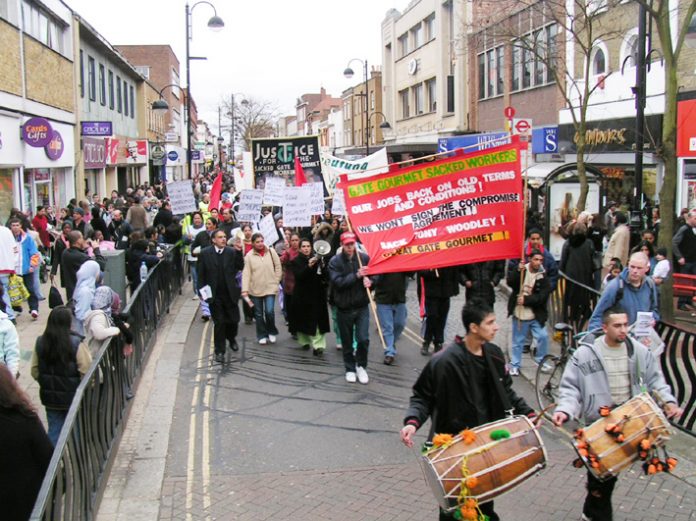
THE new Palestinian Minister of Foreign Affairs Mahmud al-Zahhar urged the international community last Saturday to respect the Palestinian people’s choice in electing the Islamic Resistance Movement, Hamas in the January legislative ballot.
Al-Zahhar, a senior Hamas leader who was sworn in as the new Palestinian top diplomat on Wednesday, also called upon the international community to give the Hamas cabinet a chance to show it was ‘clean and transparent’.
He also said that the United States should abandon its long-time partial policy that favours Israel and should not act in a hurry to pressure the new Hamas government politically and economically.
Shortly following the inauguration of the Hamas cabinet, Washington ordered its diplomats and contractors to cut off contacts with Palestinian ministries and reiterated that no US funds should go to the Hamas leadership.
Meanwhile, the US along with other members of the Quartet of Mideast mediators – the European Union, the United Nations and Russia – threatened to cut off aid to the Palestinian government if Hamas did not renounce violence, recognise Israel’s right to exist and accept interim peace deals.
Responding to this, Al Zahar said: ‘There are so many countries which are standing on the side of the Hamas cabinet and supporting its stance. We will build close diplomatic relations with these countries.’
Al-Zahhar said that the new government would reconsider previous deals with Israel, but quickly added that all the agreements reached in the past had been later destroyed by the Jewish state.
‘Do you want us to repeat the same experience?’ he asked.
Al-Zahhar also stressed that Hamas opposed holding negotiations with Israel.
‘Israel wants to negotiate only for the sake of negotiations, but on the ground, it expands settlements and continues building the separation fence on the Palestinian territories,’ he said, adding that Israel had negotiated with the Palestinians and the Arab world in the past but all the agreements made were undermined by the Jewish state.
‘Israel doesn’t want peace and nor does it have any peace project. Therefore, we should not cheat our people and tell them that there will be negotiations,’ he concluded.
But Al-Zahhar reiterated that it was possible that Hamas and its cabinet could accept a temporary two-state solution to the conflict with Israel, but he voiced doubts over whether Israel really wanted to see the establishment of an independent Palestinian state.
‘I want to ask, “Does Israel believe in the idea of two states?” ’ he said. ‘Israel is deceiving the international community and it actually wants only a Jewish state and it just hopes to see the Palestinians have an autonomous regime.’
The senior official also defended Hamas’ ultimate goal of destroying Israel and founding an Islamic state.
‘I dream of hanging a huge map of the world on the wall at my Gaza home which does not show Israel on it,’ he said. ‘I hope that our dream to have our independent state on all historic Palestine. This dream will become real one day.
‘I’m certain of this because there is no place for the state of Israel on this land,’ said Al-Zahhar.
However, he didn’t rule out the possibility of having Jews, Muslims and Christians living under the sovereignty of an Islamic state, adding that the Palestinians never hated the Jews and that only the Israeli occupation was their enemy.
Al-Zahhar also said that the Hamas cabinet might make contacts with Israel in running the daily affairs of the Palestinians on some occasions, but stressed that these contacts would never be promoted to political talks.
In addition, Al-Zahhar sharply criticised Israel for halting the transfer of monthly tax revenues to the Palestinian government, urging Israel to allow continuous flow of humanitarian aid to the Palestinian people.
Al-Zahhar also rejected the disarmament of Hamas’ armed wing the Izz-al-Din al-Qassam Brigades, stressing that the Hamas government would continue supporting armed resistance against Israeli occupation.
‘Why should we disarm the militants while the Palestinian territories are still occupied? The people should defend themselves,’ he said.
On the Palestinian internal political situation, Al-Zahhar said that the Hamas cabinet would work together with President Mahmud Abbas, dismissing that there were differences between the two sides.
Meanwhile, The Islamic Resistance Movement, Hamas, has condemned the ‘savage’ Israeli occupation government assault on unarmed Palestinian prisoners incarcerated in the Negev jail and the forced transfer of hundreds of them to central Israeli jails last Sunday.
‘The IOF (Israeli Occupation Forces) barbaric attack on the elites of our people in the Negev prison unmasks, indeed, the Israeli terrorism and gruesome image, and the savage mentality in dealing with the Palestinian people and inmates’, noted a statement issued by the Movement.
The Movement urged the Palestinian people to unite behind the captives and support their cause as it called on the international community to break its negative silence and punish the Hebrew state for such a flagrant undermining of the international conventions.
The statement urged Palestinian resistance fighters to double efforts and to resort to all means to secure freedom of those detainees.
PNA (Palestinian National Authority) officials, including the PLC (Palestinian Legislative Council) presidency and ministers of the Hamas-led government, flayed the Israeli crime as they appealed to all Palestinian forces and parties as well as human rights and civic organisations to place the issue of the prisoners on top of their priorities.
Other Palestinian lawmakers, including legislator Amad Nufal, appealed to the UN and human rights organisations, including the Red Cross, to carry out their mandates in protecting human rights.
Criticism to the IOF troops storming operation of the jail crossed the borders as the international solidarity for human rights deprecated the Israeli act, describing the Israeli step as ‘a provocative step that displays the aggressive mentality of the Israeli occupation government’.
Thousands of fully geared Israeli soldiers encircled the prison and started firing off teargas canisters and rubber-coated bullets at the prisoners before storming the prison cells in a bid to forcibly transfer 240 inmates to central jails.